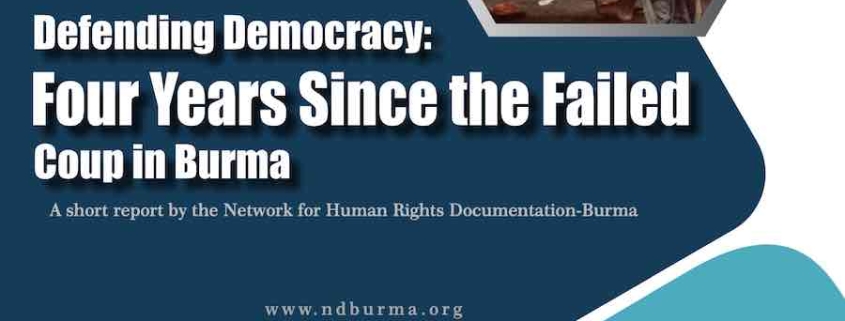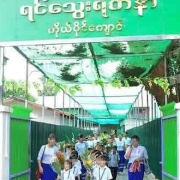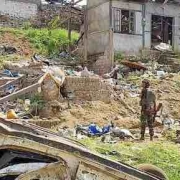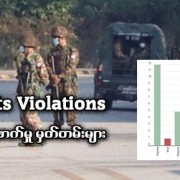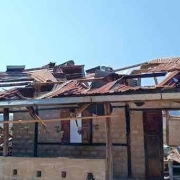Defending Democracy: Four Years Since the Failed Coup in Burma
A short report by the Network for Human Rights Documentation-Burma

Despite the many challenges and changes that the people of Burma have unjustly experienced since the attempted coup on 1 February 2021, there remains a joint commitment and effort for a federal and democratic future. Four years ago, the military junta did not hesitate to fire bullets at peaceful, unarmed protesters who swiftly denounced the General’s disregard for the nationwide 2020 election results, in which the National League for Democracy (NLD) party won its second landslide victory since coming to power in 2015.
On the morning of when the new Parliament was set to resume, coup leader Min Aung Hlaing, along with his corrupt allies, immediately changed course by hijacking and dismissing the results. Despite no evidence of fraud or interference, the regime claimed that the election was stolen and that it was, therefore, the rightful ruler to govern. They arrested their political opponents, including the leader of the NLD party, Daw Aung San Suu Kyi, and President U Win Myint.
The junta expected to be recognized as the governing authority, believing the civilian population would promptly comply. This assumption was a significant misjudgment, as the military seriously underestimated the determination, commitment, and dedication of the millions who still oppose the regime’s oppressive actions.
Young people, notably women, were among the first to organize protests and led creative campaigns calling for immediate action by the international community to bring an end to decades of military rule in Burma. The military responded with deadly force. The first case of violent suppression of civic freedoms occurred on February 9, 2021, when police shot and killed a young woman peacefully protesting. This brutality only intensified the protesters’ resolve as they called for an end to injustices, urging the junta to restore power to democratically elected officials and to release all unjustly imprisoned individuals.
Four years later, unfortunately, all calls remain unanswered, as they have been ignored not only by the terrorist regime but also by international and regional stakeholders, including the Association of Southeast Asian Nations (ASEAN), who refuse to act with the urgency that the crisis warrants. The junta has swiftly targeted individuals attempting to undermine its agenda.
The National Unity Government of Myanmar (NUG) was established less than two months after the coup. It is Burma’s only legitimate representation, founded by the Committee Representing Pyidaungsu Hluttaw (CRPH). The NUG arose from the democratic elections in 2020 and collaborative efforts with the National Unity Consultative Council (NUCC). On September 7, 2021, the NUG proclaimed a ‘defensive war’ against the junta, marking the shift from peaceful protests to armed resistance in the people’s revolution. The People’s Defense Forces (PDFs), made up of civilians trained for combat, are now allied with various ethnic revolutionary organizations (EROs) in their fight for freedom against the military junta.
In the time that has elapsed, many things have changed. However, longstanding concerns remain woefully unaddressed. The human rights situation has significantly worsened, as millions are displaced and thousands remain unjustly imprisoned. By the end of 2024 alone, the NUG Ministry of Human Rights recorded an alarming 7,394 cases of widespread and systematic attacks in various forms against civilians. Their documentation included nearly 1800 cases of extrajudicial killings and 1355 cases of property destruction. ND-Burma member the Assistance Association for Political Prisoners (AAPP) also released findings which found nearly 100 civilians, including fourteen under the age of 18, were killed in December 2024. The majority, approximately 45, lost their lives in airstrikes. A subsequent report, “Close the Sky” by Blood Money Campaign, reported over 4000 airstrike incidents between 1 February 2021 and November 2024.
And yet, the international community, including ASEAN, has repeatedly engaged with the military which has risked lending the regime the legitimacy it so desperately craves.
Further, the junta’s crimes have been largely ignored, encouraging it to push forward with plans for a fraudulent election scheduled for later this year. Despite this, the military is increasingly losing control of bases and territory across various states and regions. Their denial of their current reality is contested by the decision to implement forced conscription. Enacted nearly a year ago, the newly passed law highlights the junta’s desperation to restore its strategic leverage. There have been record levels of military defections and historically low morale throughout the various battalions. Furthermore, following its setbacks against EROs there has been a significant increase in aerial assaults by the junta.
Without immediate and coordinated action by international stakeholders, including consultations with civil society organizations, to end the junta’s retaliatory and indiscriminate attacks, the military will only continue to perpetrate human rights violations with the same impunity it has benefited from for more than seven decades.

